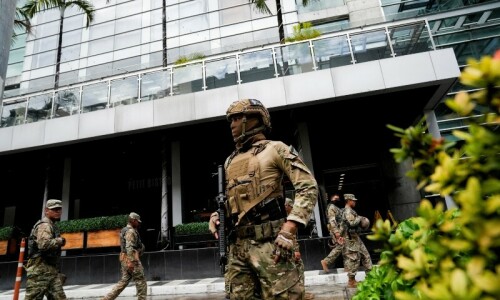ON Monday, the Supreme Court overturned earlier judgements made by the high courts to release under-trial prisoners in light of the coronavirus epidemic. Fearing the spread of the virus inside the notoriously overcrowded prison spaces, last month, the Islamabad High Court decided that all under-trial prisoners at the Adiala Jail, involved in minor crimes, were to be freed on bail, while also advising the police not to make further arrests of petty criminals during the health crisis. Following the order, nearly 300 prisoners were released from jail. Meanwhile, Sindh released hundreds of prisoners involved in minor crimes on the orders of Sindh High Court Chief Justice Ahmed Ali M. Shaikh. These decisions were in line with a global conversation about prisoner rights and capacity issues — the result of judicial lethargy and over-incarceration by law enforcement — during the ongoing coronavirus pandemic. Islamabad High Court Chief Justice Athar Minallah was correct to point out how susceptible prisoners were to the spread of the infection, especially given the poor hygiene standards, lack of medical care, and the already present ailments within prison confines. Earlier, a committee tasked with investigating human rights abuses and the lack of medical assistance in prisons found that over 5,000 inmates suffered from some form of illness, with nearly 2,400 inflicted with diseases such as HIV, hepatitis or tuberculosis. One can only dread what would happen to such vulnerable prisoners if they were infected by the novel coronavirus. How could anyone realistically ensure social distancing amongst prisoners, when, in Adiala Jail alone, some 5,000 prisoners are packed against the capacity of only 2,174 individuals? Furthermore, inmates could pass on the virus to prison staff they come in contact with, who would in turn infect their family and community.
The latest decision has come at a point when the coronavirus has already been detected within the prison population, although the apex court did retain an exception for under-trial prisoners who are incarcerated for crimes carrying a sentence of less than three years. Last month, the SC ordered the provincial authorities to ensure that fumigation is carried out within prison confines, but in Punjab alone, nearly 50 prisoners were recently diagnosed with the virus. It is a good time to be reminded of the fact that over 60pc of all prisoners are under trial, waiting to hear their verdicts, their fate hanging in a state of indefinite purgatory.
Published in Dawn, April 9th, 2020












































